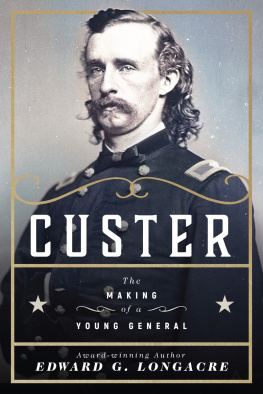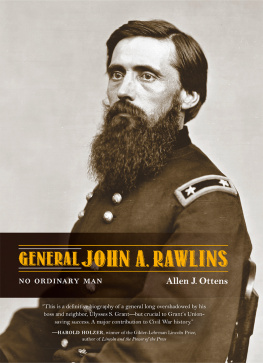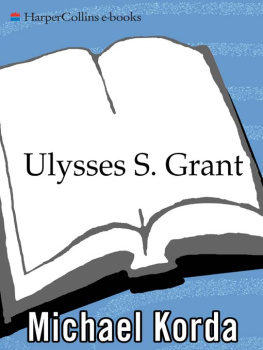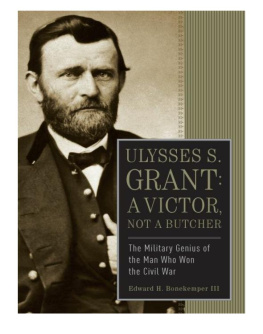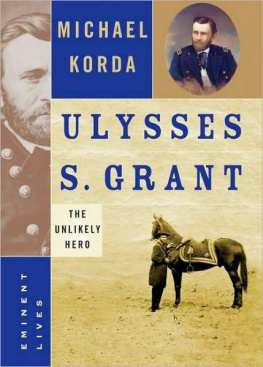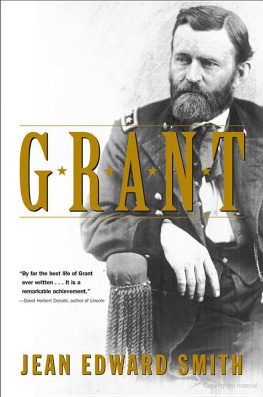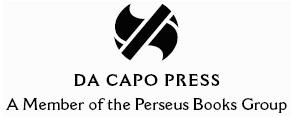Copyright 2006 by Edward G. Longacre
All rights reserved. No part of this publication may be reproduced, stored in a retrieval system, or transmitted, in any form or by any means, electronic, mechanical, photocopying, recording, or otherwise, without the prior written permission of the publisher. Printed in the United States of America.
Da Capo Press books are available at special discounts for bulk purchases in the U.S. by corporations, institutions, and other organizations. For more information, please contact the Special Markets Department at the Perseus Books Group, 11 Cambridge Center, Cambridge, MA 02142, or call (800) 255-1514 or (617) 252-5298, or e-mail
PREFACE
T HIS BOOK DOES NOT PURPORT TO BE THE DEFINITIVE BIOGRAPHY OF ULYSSES S. Grant. One reason is that it covers his life only from birth through the end of the Civil War; any examination of Grants presidential administration is best left to political historians. Furthermore, the present study, which highlights those events that materially influenced the development of Grant as a soldier and a man, is too brief to satisfy readers seeking a micro history of his military career. Recent biographies, including William S. McFeelys award-winning Grant (1981), Geoffrey Perrets readable Ulysses S. Grant, Soldier & President (1997), Brooks D. Simpsons incisive Ulysses S. Grant: Triumph over Adversity (2000), and Jean Edward Smiths magisterial Grant (2001), offer deeper, broader, and more detailed coverage of their subjects military operations.
In place of broad scope and heavy detail, Ulysses S. Grant: The Soldier andthe Man concentrates on topics and issues that appear to have received insufficient attention or which, in the hands of other biographers, have generated more heat than light. These include Grants boyhood and early married life, especially his years in Missouri and Illinois following his 1854 resignation from the army; his moral, ethical, and religious views; his conflicting attitudes toward the profession he had adopted; his relationships with his parents, his in-laws, and his wartime superiors and subordinates; and, especially, his weakness for alcohol, which, although exaggerated and misrepresented by many chroniclers, exerted a major influence on his military and civilian careers.
Although sensitive to the controversial nature of the subject and aware of the clamor it continues to provoke among Grants more vociferous advocates, I am convinced that the general was, under criteria established by present-day medical specialists, an alcoholic. Grant was neither a constant drinker norexcept on a few well-publicized occasionsa falling-down drunk. At times, he appears to have drunk moderately and without noticeable effect. When he did imbibe to excess, he often made himself ill, which should have served as a deterrent to repeat occurrences. On few occasions did his consumption of alcohol cloud his faculties or impair his motor skills, and no one who wrote of Grants personal habits contended that his drinking prevented him from discharging his ordained duties. Many of the anecdotes on which his reputation as a drunkard were built are exaggerations or fabrications, the fruit of army gossip that prized sensationalism over truth. That said, Grant became inebriated on too many occasions, and too often proved unable to stop drinking short of fortuitous or designed intervention, to be absolved of the charge of alcoholism. Quarreling over whether or not he had a drinking problem is less important to an appreciation of his strivings and accomplishments than determining how the habit affected him throughout the Civil War, which is what the present study hopes to accomplish.
In a very real sense, this book originated with my April 1982 participation in a panel session devoted to the subject of Grants drinking problems presented during the annual meeting of the Organization of American Historians. Fellow panelists included Professor John Y. Simon of Southern Illinois University, the president of the Ulysses S. Grant Association and editor of the Grant Papers project; and Professor McFeely, whose portrait of Grant would soon be awarded the Pulitzer Prize for biography. The session involved the critiquing of a paper prepared by Professor Lyle W. Dorsett, then a member of the faculty of the University of Denver. Professor Dorsetts paper, a serious treatment of Grants tendency to alcoholism later published in a scholarly journal, helped to shape, and in many ways to reorient, my thinking on the subject. More than two decades later, his observations continue to resonate with me. Although some of my opinions on the subject differ slightly from his, his groundbreaking research has materially influenced the thinking that went into this book.
It seems necessaryat least advisableto state that in presenting my view of Grants life and career I intend neither to condemn nor to vilify, but to illuminate and explain. At bottom, I hope to show why a habit that has compromised, crippled, and killed millions of souls since the dawn of time failed to prevent Ulysses Grant from gaining the confidence of his soldiers, his president, and the people of the North, and from attaining the highest honors an American soldier can aspire to.

In addition to Professor Dorsett (now a member of the faculty of the Beeson Divinity School at Samford University), numerous persons lent support and encouragement during the planning and researching of this book. Among others, I thank my editor, Robert Pigeon; my cartographer, Paul Dangel; my pictorial specialist, Bill Godfrey; my colleagues in the Air Force History Program, especially Bob Oliver; and my research assistant (who is also my wife), Melody Ann Longacre. Further, I acknowledge my indebtedness to the U. S. Grant Association, Carbondale, Ill., and to the staffs of the National Archives, the Library of Congress (especially the Manuscript Division), the New York Public Library, the United States Military Academys Archives and Special Collections, the Historical Society of Delaware, the Doheny Library of the University of Southern California, the New York Public Library, the Gilder Lehrman Collection, the Historical Society of Pennsylvania, the College of William and Marys Swem Library, and the interlibrary loan desks at the Bateman Library, Langley Air Force Base, Virginia, and the Virgil I. Grissom Library, Newport News, Virginia. I thank those who guided, accompanied, or assisted me during my trips to the various battlefields on which I traced Grants steps, scrutinized his decisions, and attempted to discern his intentions. Finally, I thank those physicians and health officials who helped me attain a deeper understanding of alcoholism, especially in the context of nineteenth-century American society.


